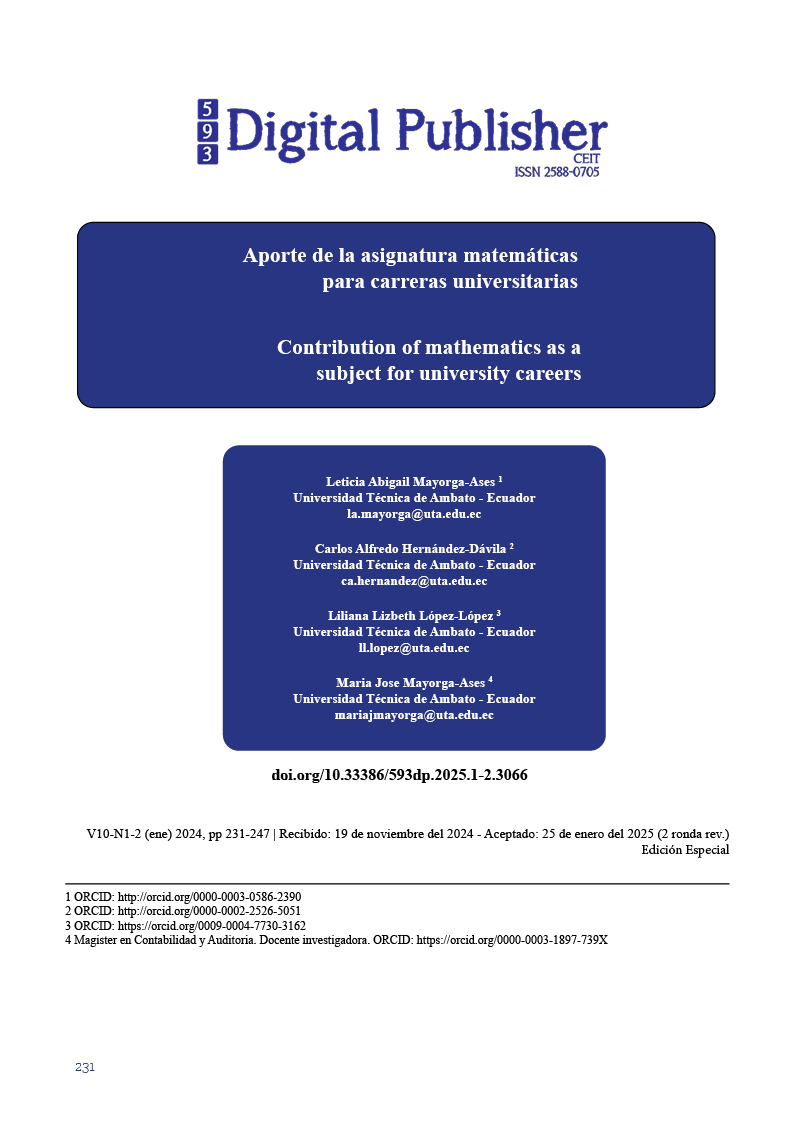Aporte de la asignatura matemáticas para carreras universitarias
Contenido principal del artículo
Resumen
Las matemáticas juegan un papel fundamental en las universidades, pero su relevancia y aplicación varían significativamente según la disciplina. En áreas como ingeniería, arquitectura y ciencias de la computación, las matemáticas son esenciales para la resolución de problemas técnicos, y los estudiantes tienden a valorarlas positivamente. Sin embargo, enfrentan dificultades para aplicar conceptos abstractos a situaciones prácticas, lo que requiere un enfoque pedagógico que combine teoría con ejercicios prácticos y herramientas tecnológicas. Por otro lado, en disciplinas como ciencias sociales, derecho y artes, las matemáticas se perciben como una herramienta complementaria, utilizada principalmente para el análisis de datos. La resistencia al aprendizaje de matemáticas y la percepción de que son irrelevantes son barreras comunes en estas áreas, lo que subraya la necesidad de enfoques pedagógicos que conecten las matemáticas con la práctica profesional de estas disciplinas. En disciplinas como las artes y la educación, aunque las matemáticas son vistas con menos interés, su aplicación en aspectos como el diseño y la enseñanza puede ser valorada si se contextualiza adecuadamente. A futuro, se recomienda investigar enfoques pedagógicos personalizados que integren las matemáticas de manera más contextualizada y aplicada a cada disciplina, aprovechando tecnologías innovadoras y estrategias didácticas adaptadas a las necesidades específicas de los estudiantes.
Descargas
Detalles del artículo

Esta obra está bajo una licencia internacional Creative Commons Atribución-NoComercial-CompartirIgual 4.0.
1. Derechos de autor
Las obras que se publican en 593 Digital Publisher CEIT están sujetas a los siguientes términos:
1.1. 593 Digital Publisher CEIT, conserva los derechos patrimoniales (copyright) de las obras publicadas, favorece y permite la reutilización de las mismas bajo la licencia Licencia Creative Commons 4.0 de Reconocimiento-NoComercial-CompartirIgual 4.0, por lo cual se pueden copiar, usar, difundir, transmitir y exponer públicamente, siempre que:
1.1.a. Se cite la autoría y fuente original de su publicación (revista, editorial, URL).
1.1.b. No se usen para fines comerciales u onerosos.
1.1.c. Se mencione la existencia y especificaciones de esta licencia de uso.
Citas
lbay, E. M., & Eisma, D. V. (2025). Using design thinking for developing pre-service teachers’ creativity in designing teaching plans to promote interactive learning in mathematics. Learning and Instruction, 96, 102070. https://doi.org/10.1016/j.learninstruc.2024.102070
Bahr, P. R. (2008). Does mathematics remediation work?: A comparative analysis of academic attainment among community college students. Research in Higher Education, 49(5), 420–450. https://doi.org/10.1007/s11162-008-9089-4
Bernsteiner, A., Haagen-Schützenhöfer, C., & Schubatzky, T. (2025). Teacher Education in the Age of Digitality: Conclusions From a Design-Based Research Project. European Journal of Education, 60(1), e12904. https://doi.org/10.1111/ejed.12904
Blair, C., Ursache, A., Greenberg, M., & Vernon-Feagans, L. (2015). Multiple aspects of self-regulation uniquely predict mathematics but not letter-word knowledge in the early elementary grades. Developmental Psychology, 51(4), 459–472. https://doi.org/10.1037/a0038813
Blotnicky, K. A., Franz-Odendaal, T., French, F., & Joy, P. (2018). A study of the correlation between STEM career knowledge, mathematics self-efficacy, career interests, and career activities on the likelihood of pursuing a STEM career among middle school students. International Journal of STEM Education, 5(1), 22. https://doi.org/10.1186/s40594-018-0118-3
Chang, K. E., Wu, L. J., Weng, S. E., & Sung, Y. T. (2012). Embedding game-based problem-solving phase into problem-posing system for mathematics learning. Computers and Education, 58(2), 775–786. https://doi.org/10.1016/j.compedu.2011.10.002
Devine, A., Fawcett, K., Szucs, D., & Dowker, A. (2012). Gender differences in mathematics anxiety and the relation to mathematics performance while controlling for test anxiety. Behavioral and Brain Functions, 8, 33. https://doi.org/10.1186/1744-9081-8-33
Fernanda Morales-Gómez de la Torre, M., Santiago Velastegui-Hernández, R., Jose Mayorga-Ases, M., & Belén Morales-Jaramillo, M. (2024). Dificultades de aprendizaje en estudiantes de educación superior. 593 Digital Publisher CEIT, 9(4), 637–649. https://doi.org/10.33386/593dp.2024.4.2546
Guo, J., Marsh, H. W., Parker, P. D., Morin, A. J. S., & Yeung, A. S. (2015). Expectancy-value in mathematics, gender and socioeconomic background as predictors of achievement and aspirations: A multi-cohort study. Learning and Individual Differences, 37, 161–168. https://doi.org/10.1016/j.lindif.2015.01.008
Hwang, G. J., Wang, S. Y., & Lai, C. L. (2021). Effects of a social regulation-based online learning framework on students’ learning achievements and behaviors in mathematics. Computers and Education, 160, 104031. https://doi.org/10.1016/j.compedu.2020.104031
Jang, S. J., & Tsai, M. F. (2012). Exploring the TPACK of Taiwanese elementary mathematics and science teachers with respect to use of interactive whiteboards. Computers and Education, 59(2), 327–338. https://doi.org/10.1016/j.compedu.2012.02.003
Kang, N. H. (2019). A review of the effect of integrated STEM or STEAM (science, technology, engineering, arts, and mathematics) education in South Korea. Asia-Pacific Science Education, 5(1), 1–22. https://doi.org/10.1186/s41029-019-0034-y
Lai, C. L., & Hwang, G. J. (2016). A self-regulated flipped classroom approach to improving students’ learning performance in a mathematics course. Computers and Education, 100, 126–140. https://doi.org/10.1016/j.compedu.2016.05.006
Lara Satán, A. A., Satán, N. L., Velastegui Hernández, R. S., & Pullas Tapia, P. S. (2020). Organization and management in the prevention of occupational psychosocial risks in urban public transport. Universidad y Sociedad, 12(4).
Lewis, K. L., Stout, J. G., Finkelstein, N. D., Pollock, S. J., Miyake, A., Cohen, G. L., & Ito, T. A. (2017). Fitting in to move forward: Belonging, gender, and persistence in the physical sciences, technology, engineering, and mathematics (pSTEM). Psychology of Women Quarterly, 41(4), 420–436. https://doi.org/10.1177/0361684317720186
Lo, C. K., Hew, K. F., & Chen, G. (2017). Toward a set of design principles for mathematics flipped classrooms: A synthesis of research in mathematics education. Educational Research Review, 22, 50–73. https://doi.org/10.1016/j.edurev.2017.08.002
Mayorga-Ases, M. J., Tagua-Moyolema, A. E., Germán Muyulema-Muyulema, D., & Santiago Velastegui-Hernández, R. (2024). Estudio sobre la implementación de metodologías activas en la educación superior: beneficios y desafíos. 593 Digital Publisher CEIT, 9(4–1), 196–208. https://doi.org/10.33386/593dp.2024.4-1.2739
McGee, E. O., & Martin, D. B. (2011). “You would not believe what i have to go through to prove my intellectual value!” stereotype management among academically successful black mathematics and engineering students. American Educational Research Journal, 48(6), 1347–1389. https://doi.org/10.3102/0002831211423972
Megreya, A. M., Hassanein, E. E. A., Al-Emadi, A. A., & Szűcs, D. (2025). Math anxiety mediates the association between gender and STEM-related attitudes: Evidence from a large-scale study. Acta Psychologica, 253, 104689. https://doi.org/10.1016/j.actpsy.2025.104689
Mulenga, E. M., & Marbán, J. M. (2020). Is covid-19 the gateway for digital learning in mathematics education? Contemporary Educational Technology, 12(2), 1–11. https://doi.org/10.30935/cedtech/7949
Pajares, F. (1996). Self-efficacy beliefs and mathematical problem-solving of gifted students. Contemporary Educational Psychology, 21(4), 325–344. https://doi.org/10.1006/ceps.1996.0025
Santiago Velastegui-Hernández, R., Romero-Peña, S. M., Carolina Martínez-Pérez, S., & Germán Muyulema-Muyulema, D. (2024). Analysis of Ecuador’s Higher Education processes. 593 Digital Publisher CEIT, 9(4–1), 106–117. https://doi.org/10.33386/593dp.2024.4-1.2655
Santiago Velastegui-Hernández, R., Tagua-Moyolema, A. E., Cumandá, X., -López, M., & Germán Muyulema-Muyulema, D. (2024). Análisis de la relación entre el uso de tecnologías educativas y el rendimiento académico de los estudiantes universitarios. 593 Digital Publisher CEIT, 9(4–1), 184–195. https://doi.org/10.33386/593dp.2024.4-1.2738
Stoet, G., Bailey, D. H., Moore, A. M., & Geary, D. C. (2016). Countries with higher levels of gender equality show larger national sex differences in mathematics anxiety and relatively lower parental mathematics valuation for girls. PLoS ONE, 11(4), e0153857. https://doi.org/10.1371/journal.pone.0153857
Tokac, U., Novak, E., & Thompson, C. G. (2019). Effects of game-based learning on students’ mathematics achievement: A meta-analysis. Journal of Computer Assisted Learning, 35(3), 407–420. https://doi.org/10.1111/jcal.12347
Trindade, M. A. M., Edirisinghe, G. S., & Luo, L. (2025). Teaching mathematical concepts in management with generative artificial intelligence: The power of human oversight in AI-driven learning. International Journal of Management Education, 23(2), 101104. https://doi.org/10.1016/j.ijme.2024.101104
Velastegui, R., Poler, R., & Díaz-Madroñero, M. (2023). Aplicación de algoritmos de aprendizaje automático a sistemas robóticos multiagente para la programación y control de operaciones productivas y logísticas: una revisión de la literatura reciente. Dirección y Organización, 0(80), 60–70. https://doi.org/10.37610/DYO.V0I80.643
Velastegui, R., Poler, R., & Díaz-Madroñero, M. (2025). Revolutionising industrial operations: The synergy of multiagent robotic systems and blockchain technology in operations planning and control. Expert Systems with Applications, 269, 126460. https://doi.org/10.1016/J.ESWA.2025.126460
Velastegui-Hernández, R., Hernández-Chérrez, E. de los Á., Salto, S. V. H.-D., & Mayorga-Ases, M. J. (2024). Competencias de la Educación Superior en Ecuador. 593 Digital Publisher CEIT, 9(4–1), 118–129. https://doi.org/10.33386/593dp.2024.4-1.2682
Yin, A. L. M., Jeok, Y. K., & Yan, L. C. (2025). Mobile Learning Readiness Among Malaysian Students at Higher Education in Learning Mathematics. Journal of Advanced Research in Applied Sciences and Engineering Technology, 53(2), 122–129. https://doi.org/10.37934/araset.53.2.122129





